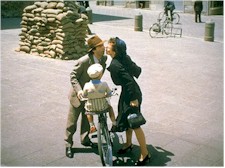|
|
|
|
||||
|
|
|
|
|
|
|
| ||||||||||||
|
|
Life is Beautiful Review by Elias Savada
 Benigni imbues his childlike Guido Orefice with an unflappable joi
de vivre and a ton of fate-filled instances and acquaintances that all afford suitable
ammunition in his courtship of a "princess" and, in the darker portion of the
feature, a giddy array of circumstances to spin a fairy tale in the face of tragedy.
Benigni, a recognized madcap comic treasure in his homeland, is no stranger to American
audiences, having appeared in Jim Jarmusch’s Down By Law and Night on Earth,
as well as showing some brighter moments as Inspector Clouseau’s pratfall of an
offspring in the feeble Son of the Pink Panther. Life Is Beautiful (La Vita è
Bella) has already garnered some incredible laurels: Grand Jury Prize at the Cannes
Film Festival, audience awards at numerous other festivals, and eight David di Donatello
(the Italian "Oscars"). It’s easy to see why. Chaplinesque in stature and
mannerism, the malleable Benigni has fashioned a charming story of a calamitous fellow
pure of heart and noble of mind. It’s hard not to please most of your audience when
you do this, and Benigni does it well. The film deserves to expand beyond its art-house
market openings here in the U.S., with a broader appeal based on the good word-of-mouth
and reviews that the film continues to amass. Benigni imbues his childlike Guido Orefice with an unflappable joi
de vivre and a ton of fate-filled instances and acquaintances that all afford suitable
ammunition in his courtship of a "princess" and, in the darker portion of the
feature, a giddy array of circumstances to spin a fairy tale in the face of tragedy.
Benigni, a recognized madcap comic treasure in his homeland, is no stranger to American
audiences, having appeared in Jim Jarmusch’s Down By Law and Night on Earth,
as well as showing some brighter moments as Inspector Clouseau’s pratfall of an
offspring in the feeble Son of the Pink Panther. Life Is Beautiful (La Vita è
Bella) has already garnered some incredible laurels: Grand Jury Prize at the Cannes
Film Festival, audience awards at numerous other festivals, and eight David di Donatello
(the Italian "Oscars"). It’s easy to see why. Chaplinesque in stature and
mannerism, the malleable Benigni has fashioned a charming story of a calamitous fellow
pure of heart and noble of mind. It’s hard not to please most of your audience when
you do this, and Benigni does it well. The film deserves to expand beyond its art-house
market openings here in the U.S., with a broader appeal based on the good word-of-mouth
and reviews that the film continues to amass.
1939, Arezzo, Italy. To this small Tuscan municipality arrives our hero, an non-observing Italian Jew, with his poetic sidekick Ferruccio (Sergio Bustric), having already been mistaken for a prince when their automobile loses its brakes. A forced stop and a blink later allows Guido the fortuitous rescue of a damsel in a dress. A walk around town, looking for work (eventually serving tables at his uncle’s elegant Grand Hotel), imparts our student of observation snippets of information on its inhabitants. Like a invasion of boomerangs, these nuggets of information (a tossed key, some hat tricks, an Offenbach opera, a riddle-obsessed German doctor, et al) return to delightful use in Benigni’s thoughtful script (co-written with Vincenzo Cerami).
Perhaps a little too melodramatic as the setting moves from sunny countryside to the grey landscape of barracks life, although Benigni straddles the fence with deft humor and a smile on his face. Into this unimaginable, barren world, the father speaks to the naïve boy of points to be earned and contests to be won as the family is torn asunder. Far-fetched, sure, but when a German officer asks for a volunteer to interpret for him, Guido immediately steps forward and "translates" into Italian instead the rules of his fancied game, not only for his child, but for the other startled prisoners who listen with slackened faces. The shtick continues through to the contrived and obvious conclusion, never disrespectful and guaranteed to leave a lump in your throat. Vittorio De Sica dealt with a similar theme more than 20 years ago with his extraordinary The Gardens of the Finzi-Continis, about a wealthy Jewish family that carries false hopes too long and are forced to tragic ends at a death camp. Benigni now makes a bold attempt for another Italian Oscar. He’s on solid footing and his celebration elevates the human spirit. Life Is Beautiful is beautiful. Contents | Features | Reviews | News | Archives | Store Copyright © 1999 by Nitrate Productions, Inc. All Rights Reserved. |
|
|